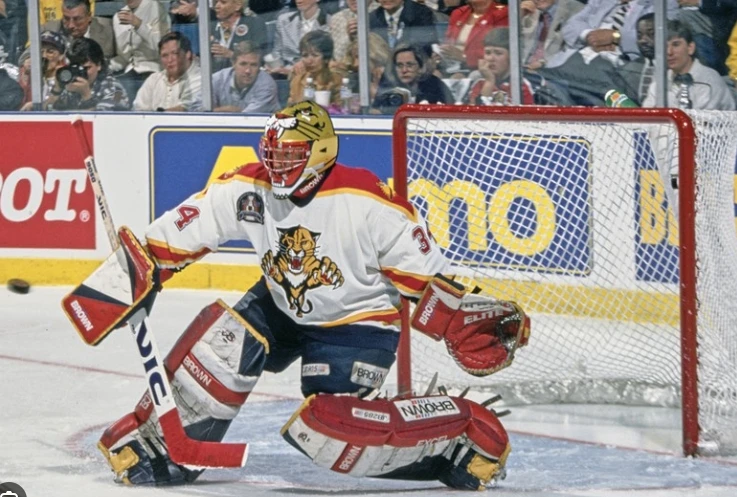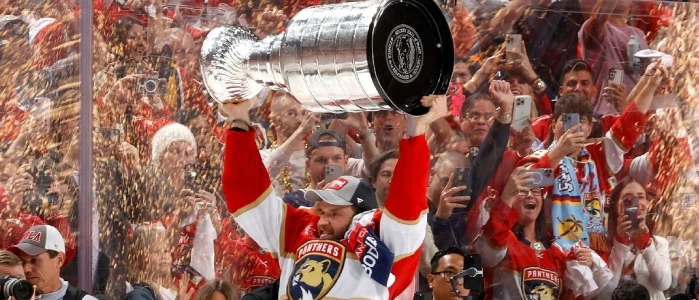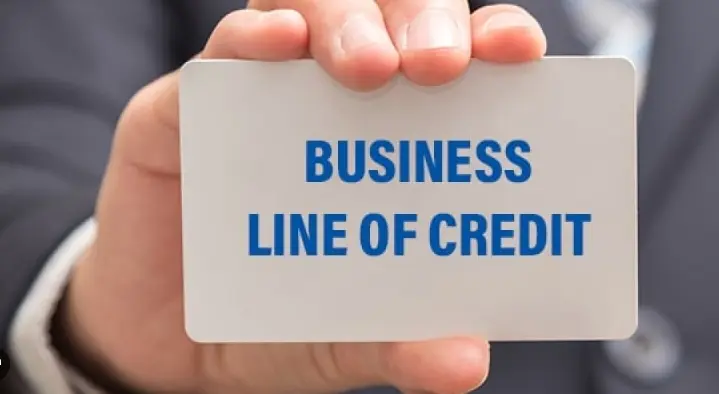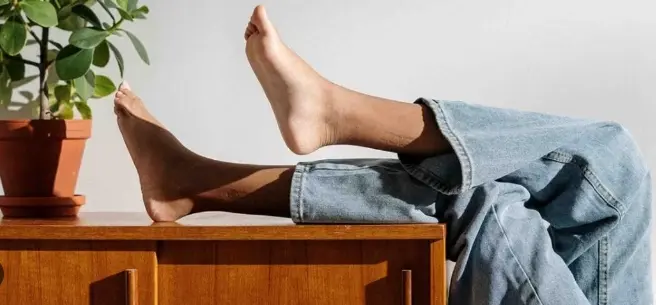Florida Panthers Defy Odds to Become Prestigious Stanley Cup Champions
Oh, there could have been more embarrassment. Like, the most embarrassment. Florida nearly fumbled the bag against Edmonton, becoming just the third team in NHL history to blow a 3-0 Stanley Cup Final series lead to force a Game 7. They could have been the Atlanta Falcons in Super Bowl LI or Greg Norman in the 1996 Masters or the 1942 Detroit Red Wings, the only team in NHL history to lose the Stanley Cup Final after winning the first three games.
It would have been very "Florida Panthers" to have done that. But that's not who this franchise is anymore. They're not a joke. They're Stanley Cup champions.
It's wholly appropriate that Florida won the Stanley Cup against a Canadian team -- a nation that thought of the Panthers as either relocation bait or a team situated in a warmer climate in which to watch their own teams at significantly lower ticket costs; and that they eliminated the NHL-leading New York Rangers in the conference finals, the kind of esteemed Original Six team that is handed the respect the Panthers have clawed to earn.
Those teams came close to championships. The Panthers are the ones who finished the story, becoming just the third team in the past 40 years to win the Stanley Cup after losing in the Final in the previous postseason.
But perhaps most incredibly: The Florida Panthers -- the Florida Panthers! -- are now a prestige franchise in the NHL.

Florida Panthers: From Underdogs to Stanley Cup Champions
"It's pretty freakin' cool," defenseman Aaron Ekblad, who is second to Barkov in career games played as a Panther, said. "It wasn't easy those first few years. There was a lot of learning and growing. New GMs, new coaches ... that revolving door was tough, right? The fact that we're at this point now, where the expectation is to make the playoffs, and the expectation is to challenge for a championship, that's a really cool thing. I'm so happy to have been through it all with this franchise."
Barkov stuck with them. Ekblad stuck with them. And more South Florida fans than you'd realize stuck with them, from the rat-tossing mid-1990s to their Stanley Cup parade this season.
WHEN FLORIDA WINGER Evan Rodrigues was growing up in Toronto, the media covered only Canadian teams and winning teams.
"So I would say I probably wasn't focused on the Panthers too much," the 30-year-old said.
Fellow Ontario native Ryan Lomberg, 29, remembered how the Panthers were covered on social media.
"I remember seeing pictures of the empty arena. Seeing all the red seats and seeing maybe a couple thousand fans. Being a kid from Toronto, I remember not really understanding how the contrast [with other teams] was so extreme," he said. "It doesn't even make sense to me how it was back then. The second I got here four years ago, the fans have been amazing. We have a strong following."

Florida's attendance woes were a league-wide punch line, and the franchise did nothing to discourage it.
"In 2004, while I was at college in Orlando, I met a guy who was a Lightning fan while I was watching the finals at a bar," Panthers fan David Roth said. "I told him I was a Panthers fan, and he looked at me with a look of absolute bewilderment and just said, 'Why?' As if it were so foreign a concept to be a fan of a team in Florida other than the Lightning."
In 2006, the Panthers were averaging over 4,100 free tickets handed out for each home game. In 2008, the team introduced the "First Timer" program, in which anyone with a valid Florida driver's license could get two free tickets to a game.
In 2010, after LeBron James made his decision to take his talents to South Beach, the Panthers responded by offering season tickets in the upper deck for $6 per game, ostensibly in honor of his new uniform number with the Heat. Even that price point didn't generate enough sales -- the team announced that summer that it was going to tarp off 2,000 upper deck seats for most home games.
"When you go 25 years between playoff series wins, and then only make the playoffs a couple of times during that span, you lose a couple of generations of fans," Florida CEO Matthew Caldwell said.
Caldwell ascended to his position in 2016, having worked with owner Vinny Viola for several years.
Viola, who purchased the team in 2013, is one of a handful of majority owners during the team's turbulent history. They were founded as an expansion team by billionaire Wayne Huizenga, who initially wanted to name them the "Block Busters" in honor of his video rental chain.
He sold the franchise to pharmaceutical businessman Alan Cohen and former NFL quarterback Bernie Kosar in 2001. Cliff Viner became general partner in 2010, and made two moves that would set up Florida for later success: Hiring former Chicago Blackhawks GM Dale Tallon as head of hockey operations, and tasking him with rebuilding through the draft.
When Viola took over, the real work began to repair the Panthers' reputation. It started with the way they ticketed games.
"There was a lot of comp tickets. Just all these gimmicks to get people into the arena," Caldwell said. "That doesn't work in the long term. It really angers your season-ticket holders when you're giving out all these freebies and promotions to people off the streets."
The Panthers used some low price points to try to get more fans into the building. Courtesy of the Florida Panthers
With the team's attendance struggles came constant relocation speculation.
"There were all these rumors that we should be moved," Caldwell said. "That this new ownership group was fixing it up and trying to relocate to Quebec at the time. Those were the headwinds we had to deal with."
The chatter got so loud that owners Viola and Doug Cifu wrote a letter to fans in 2014 to assure them the Panthers weren't relocating. "Our plan is to build an organization that makes South Florida proud and to win the Stanley Cup in South Florida," they said.
But even the Panthers' own municipality was fueling relocation speculation. Broward County did a full analysis of the Panthers franchise, and more broadly on whether or not there should be a hockey team in South Florida.
Apparently, the County found enough reasons to commit to the Panthers, agreeing to a new arena lease that put Viola's team on solid financial footing.
"It felt like a miracle at the time," Caldwell said. "But I think the county looked at it like, 'Hey, this is our last shot to see if the sport works here.'"
While the team was getting its financial house in order, Caldwell's next task was trying to energize a fan base that had sunk into malaise.
"When there's a fan base that's mad and angry and looking for a savior, that's actually a little encouraging. At least you know, they're out there and if you do the right thing, they're going to come back," he said. "The problem is that our fan base had become indifferent. There was still like 3,000 or so season-ticket holders that were loyal and wanted to see this happen. But a lot of the casual fans, former season-ticket holders, had given up."
Going 24 seasons between playoff wins will do that to a franchise. But Caldwell said getting their house in order off the ice was important for what would happen on the ice over the next decade.
WHEN THE COLORADO AVALANCHE celebrated their Stanley Cup Final sweep of the Panthers in 1996, they skated through an ever-increasing pile of plastic rats.
The rat-tossing stems from a legendary moment in 1995-96 when forward Scott Mellanby used his stick to exterminate a rat in the locker room before a game. He then used the same stick to score two goals that night -- accomplishing what his teammates called "a rat trick." To this day, rubber rats are available for purchase in the official Florida team store for $5 each, with the store selling upward of 150 on game days.
The plastic rats were symbolic of what the franchise had created in its third NHL season: tradition. The Cinderella run bonded hockey fans and minted new ones. A few days after the 1996 Final, the Panthers hosted 15,000 fans at Miami Arena for a celebration of that season's success.





